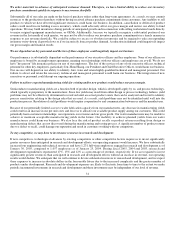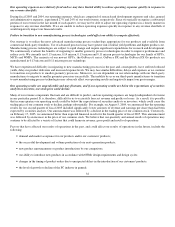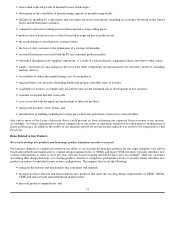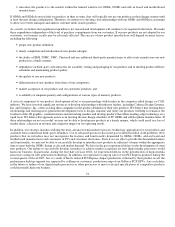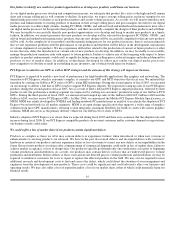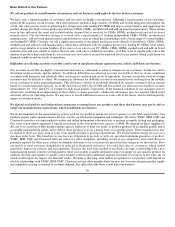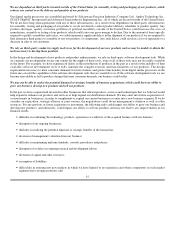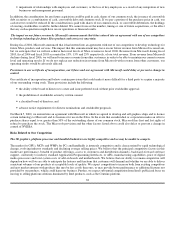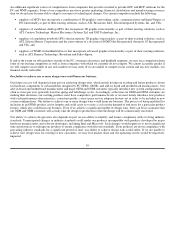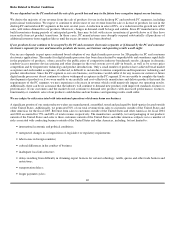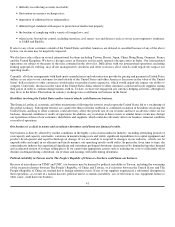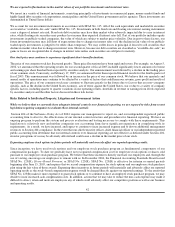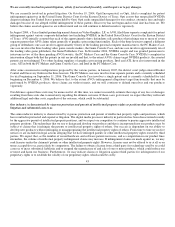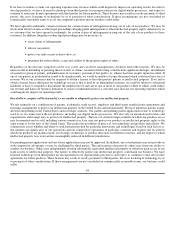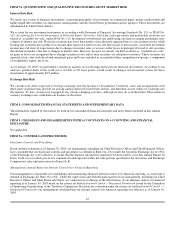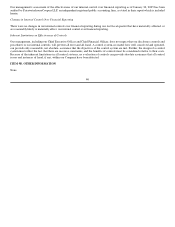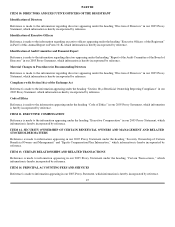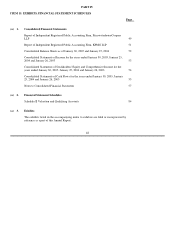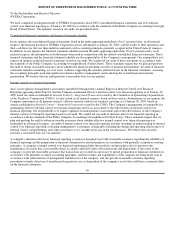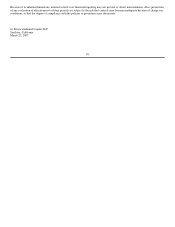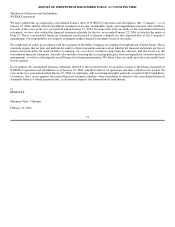NVIDIA 2005 Annual Report Download - page 47
Download and view the complete annual report
Please find page 47 of the 2005 NVIDIA annual report below. You can navigate through the pages in the report by either clicking on the pages listed below, or by using the keyword search tool below to find specific information within the annual report.
• difficulty in collecting accounts receivable;
• fluctuations in currency exchange rates;
• imposition of additional taxes and penalties;
• different legal standards with respect to protection of intellectual property;
• the burdens of complying with a variety of foreign laws; and
• other factors beyond our control, including terrorism, civil unrest, war and diseases such as severe acute respiratory syndrome,
or SARS and Bird flu.
If sales to any of our customers outside of the United States and other Americas are delayed or cancelled because of any of the above
factors, our revenue may be negatively impacted.
We also have sales offices in several international locations including Taiwan, Russia, Japan, China, Hong Kong, Germany, France
and the United Kingdom. We have a design center in Germany and recently opened a design center in India. Our international
operations are subject to the many of the risks contained in the above list. Difficulties with our international operations, including
finding appropriate staffing, may divert management's attention and other resources all of which could negatively impact our
operating results.
Currently, all of our arrangements with third−party manufacturers and subcontractors provide for pricing and payment in United States
dollars as are sales to our customers located outside of the United States and other Americas. Increases in the value of the United
States' dollar relative to other currencies would make our products more expensive, which would negatively impact our ability to
compete. Conversely, decreases in the value of the United States' dollar relative to other currencies could result in our suppliers raising
their prices in order to continue doing business with us. To date, we have not engaged in any currency hedging activities, although we
may do so in the future. Fluctuations in currency exchange rates could harm our business in the future.
Hostilities involving the United States and/or terrorist attacks could harm our business.
The financial, political, economic and other uncertainties following the terrorist attacks upon the United States led to a weakening of
the global economy. Subsequent terrorist acts and/or the threat of future outbreak or continued escalation of hostilities involving the
United States and Iraq or other countries could adversely affect the growth rate of our revenue and have an adverse effect on our
business, financial condition or results of operations. In addition, any escalation in these events or similar future events may disrupt
our operations or those of our customers, distributors and suppliers, which could also adversely affect our business, financial condition
or results of operations.
Our business is cyclical in nature and an industry downturn could harm our financial results.
Our business is directly affected by market conditions in the highly cyclical semiconductor industry, including alternating periods of
overcapacity and capacity constraints, variations in manufacturing costs and yields, significant expenditures for capital equipment and
product development and rapid technological change. If we are unable to respond to changes in our industry, which can be
unpredictable and rapid, in an efficient and timely manner, our operating results could suffer. In particular, from time to time, the
semiconductor industry has experienced significant and sometimes prolonged downturns characterized by diminished product demand
and accelerated erosion of average selling prices. If we cannot take appropriate actions such as reducing our costs to sufficiently offset
declines in demand during a downturn, our revenue and earnings will suffer during downturns.
Political instability in Taiwan and in The People's Republic of China or elsewhere could harm our business.
Because of our reliance on TSMC and UMC, our business may be harmed by political instability in Taiwan, including the worsening
of the strained relations between The People's Republic of China and Taiwan, or if relations between the United States and The
People's Republic of China are strained due to foreign relations events. If any of our suppliers experienced a substantial disruption in
their operations, as a result of a natural disaster, political unrest, economic instability, acts of terrorism or war, equipment failure or
other cause, could harm our business.
41


